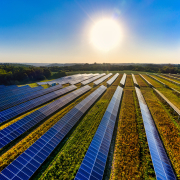AgriSolar News Roundup: Solar Lease Considerations, Pennsylvania Agrisolar Development, Agrisolar in Australia, California Agrisolar Politics
Things to Consider Before Signing a Solar Lease
“Part one of a three-part series on solar leases and considerations for lawyers and landowners. This is based on a presentation by Rusty Rumley, senior staff attorney, National Agricultural Law Center at the University of Arkansas System Division of Agriculture. The presentation was delivered at the tenth annual Mid-South Agricultural and Environmental Law Conference in Memphis, Tenn.” – Farmprogress.com
Pennsylvania Group Pitches Farms on Solar Models
“Solar development on farmland is happening across central Pennsylvania — in some cases generating opposition from people who don’t like the look of solar panels and object to the loss of open land.
Pasa Sustainable Agriculture is working to introduce farmers to a different way of building solar farms that allows farming to continue and creates a smaller footprint. They hope it’s a way to address concerns in communities that have objected to large-scale solar. The model is called agrivoltaics, and it uses raised panels to generate solar energy while farming or livestock grazing continues beneath.” – stateimpact.npr.org
Australian Agrivoltaic Project Development Set to Move Forward
“A “farmer-led” utility-scale solar PV and battery storage agrivoltaics project in New South Wales, Australia, has been granted development consent.
The state’s government has decided to grant consent to the development application for Blind Creek Solar Farm. The project was originated by a group of farmers and is now being developed by Octopus Australia and the national Clean Energy Finance Corporation (CEFC) together with its founders.” – energystorage.com
A Second Amendment Amendment
“California may be a national leader in both solar energy and agriculture, but it’s lagging behind other states in combining the two. Putting solar panels directly on active farmland is supported by the Biden administration, which provided $8 million for projects last year. The Midwest and Southeast lead the country in the number of what are also known as agrisolar projects.
Early research suggests agrivoltaics can not only help produce renewable electricity, but also improve crop yields. “Sounds almost too good to be true,” California Food and Agriculture Secretary Karen Ross quipped today during a panel on the practice held by the California Council on Science and Technology. In California, growers are more used to fighting utility-scale solar developers eyeing their land.
Ross highlighted a proposal by state Sen. Steve Padilla (D-San Diego), SB 688, that would set up a grant program at the State Energy Resources Conservation and Development Commission for agrivoltaics research projects. The bill does not appropriate any funding.” – Politico.com



